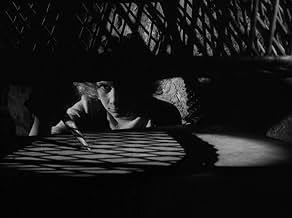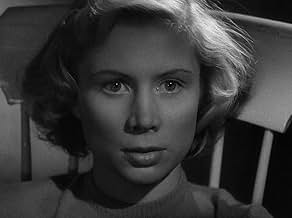AVALIAÇÃO DA IMDb
6,7/10
2,3 mil
SUA AVALIAÇÃO
Adicionar um enredo no seu idiomaA film director tries to create the best film in history, but finds out that human abilities have their limits.A film director tries to create the best film in history, but finds out that human abilities have their limits.A film director tries to create the best film in history, but finds out that human abilities have their limits.
Birgit Lindkvist
- Anna - inneboende på pensionatet
- (as Bibi Lindkvist)
John W. Björling
- En man i Birgitta Carolinas dröm
- (não creditado)
Sven Björling
- En filmarbetare i ateljén
- (não creditado)
Anita Blom
- Anna - Signes kusindotter
- (não creditado)
Britta Brunius
- Lasses mamma
- (não creditado)
Åke Engfeldt
- Ena kriminalpolisen
- (não creditado)
Gösta Ericsson
- Andra kriminalpolisen
- (não creditado)
Kenne Fant
- Arne - Skådespelare
- (não creditado)
Avaliações em destaque
I am a big Begman fan, and in recent times I've gone back to some of the early films - initially just because I thought it might be interesting to see the "juvenilia", but gradually I realised that so many of them are wonderful. I've now seen Prison 4 times, and each time I am stunned by how moving and visually powerful it is. And the performance by Doris Svedlund is breath-taking. Is it the most polished film? Who cares!
Bergman did many dream sequences in films (e.g. Wild Strawberries, Face to Face) - really hard to make them un-cringey - but the one in Prison is about as good as it gets.
So wonderful artistically, and very moving in terms of human interest. There is an orthodoxy about peoples "great" films which often gets in the way of just seeing what is there - please do watch great Bergman film .. I hope you won't be disappointed!
Bergman did many dream sequences in films (e.g. Wild Strawberries, Face to Face) - really hard to make them un-cringey - but the one in Prison is about as good as it gets.
So wonderful artistically, and very moving in terms of human interest. There is an orthodoxy about peoples "great" films which often gets in the way of just seeing what is there - please do watch great Bergman film .. I hope you won't be disappointed!
Minor, depressing early Ingmar Bergman drama, bulit on an ambitious life-mirrors-art concept that doesn't really come off. It begins with the premise of a director being pitched the idea of making a film that depicts "Hell on Earth", but then the movie seems to try to prove this thesis via the story of some people involved in the filmmaking process. There is one notable extended dream sequence, but the most original touch is probably the spoken opening credits that never actually appear on the screen. It's a well-made and well-acted film, but one recommended mostly for dedicated Bergman followers. ** out of 4.
Bergman's first film where he wrote his own script, and had real artistic control (in exchange for a tiny budget.).
An aging film professor, just released from a mental asylum, visits an old student, now a successful director, and challenges him to make a film showing that the devil really rules the earth. While dismissive in the moment, the director is haunted by the idea, and a journalist friend suggests the film could take off from his experience interviewing a very young prostitute.
We then enter the prostitute's story, and it's (intentionally) never fully clear if what we're seeing is the film that arose from the concept, or the truth of the girl's life.
Beautifully photographed, and full of inventive touches (the main credits are spoken, not seen, over a long tracking shot of a dark cobblestone street), I was also surprised that it contained more of a dark sense of humor, about itself and the world, then most critics acknowledge. In turn, that keeps the film's occasional youthful over-obsession with despair from ever feeling unbearably sophomoric.
I will admit it lost steam for me in the last third, some of the performers aren't quite up to the heavy burdens of the script, and a few sequences are awkward and bespeak Bergman's comparative youth. But the next morning I found myself haunted by images and moments even if the whole only felt partly successful.
An aging film professor, just released from a mental asylum, visits an old student, now a successful director, and challenges him to make a film showing that the devil really rules the earth. While dismissive in the moment, the director is haunted by the idea, and a journalist friend suggests the film could take off from his experience interviewing a very young prostitute.
We then enter the prostitute's story, and it's (intentionally) never fully clear if what we're seeing is the film that arose from the concept, or the truth of the girl's life.
Beautifully photographed, and full of inventive touches (the main credits are spoken, not seen, over a long tracking shot of a dark cobblestone street), I was also surprised that it contained more of a dark sense of humor, about itself and the world, then most critics acknowledge. In turn, that keeps the film's occasional youthful over-obsession with despair from ever feeling unbearably sophomoric.
I will admit it lost steam for me in the last third, some of the performers aren't quite up to the heavy burdens of the script, and a few sequences are awkward and bespeak Bergman's comparative youth. But the next morning I found myself haunted by images and moments even if the whole only felt partly successful.
This is the earliest Bergman film that I've watched, and already the prime concerns that occupied him throughout most of his career - human relationships, sex, faith, death, etc. - are well in evidence.
Interestingly, the narrative is set against a motion-picture backdrop; in fact, the film demonstrates a self-conscious approach to the medium that would re-emerge in later efforts such as PERSONA (1966) and THE PASSION OF ANNA (1969): rather than observing the normal procedure for the time, the credits don't appear at the outset but, effectively interrupting the proceedings after the first reel, these are given in a voice-over! Besides, the plot seems to be following the interconnecting vicissitudes of a variety of characters - but chiefly the crisis facing two separate couples - all of which, somewhat murkily and pretentiously, serves as a morality play about the triumph of Evil over Good, as envisioned in a framework set inside a studio and involving a film director's old ex-professor (the former happens to be the elder brother of one of the characters in the main narrative!).
It's all rather fascinating for much of the running-time - and the director's visual style really can't be faulted (a dream sequence is especially effective and there's even a short and quite amusing Silent slapstick film-within-a-film, ostensibly the amateurish work of one of the characters!) - but, eventually, the over-ambitious structure of PRISON (by the way, neither this vague title nor the equally well-known alternate given the film on its American release, THE DEVIL'S WANTON, really serve the purpose of its existentialist theme and generally introspective tone), to say nothing of the relentless gloominess, wear the whole down somewhat. All in all, however, it's a fine piece of work from a film-maker who would go on to become one of the leading forces in cinema during the second half of the 20th century.
Interestingly, the narrative is set against a motion-picture backdrop; in fact, the film demonstrates a self-conscious approach to the medium that would re-emerge in later efforts such as PERSONA (1966) and THE PASSION OF ANNA (1969): rather than observing the normal procedure for the time, the credits don't appear at the outset but, effectively interrupting the proceedings after the first reel, these are given in a voice-over! Besides, the plot seems to be following the interconnecting vicissitudes of a variety of characters - but chiefly the crisis facing two separate couples - all of which, somewhat murkily and pretentiously, serves as a morality play about the triumph of Evil over Good, as envisioned in a framework set inside a studio and involving a film director's old ex-professor (the former happens to be the elder brother of one of the characters in the main narrative!).
It's all rather fascinating for much of the running-time - and the director's visual style really can't be faulted (a dream sequence is especially effective and there's even a short and quite amusing Silent slapstick film-within-a-film, ostensibly the amateurish work of one of the characters!) - but, eventually, the over-ambitious structure of PRISON (by the way, neither this vague title nor the equally well-known alternate given the film on its American release, THE DEVIL'S WANTON, really serve the purpose of its existentialist theme and generally introspective tone), to say nothing of the relentless gloominess, wear the whole down somewhat. All in all, however, it's a fine piece of work from a film-maker who would go on to become one of the leading forces in cinema during the second half of the 20th century.
An ex Maths teacher announces he's just been released from a lunatic asylum (as you do) to some people making a film. (He used to teach one of them). He says that he has ideas about the Devil. The filmmakers try to adapt those ideas into a screenplay. Apparently they reject those ideas -after making them - for this film presumably.
The meandering narrative seems to explore scenarios that surround some pretty miserable and uninteresting people. I think I read that it's Bergman's first film to look solely at mild horror and the place of the Devil, both in philosophy, film and in folklore. Suicide, alcoholism, prostitution, even drowning babies born to the under-aged get limp, clumsy and unconvincing treatment.
It's pretty impossible to follow and no doubt spoilt by knowing what gems came later from the Master of Darkness.
Best thing to come out of it was a line that I've slightly altered - "Life Itself is a terminal illness "
The meandering narrative seems to explore scenarios that surround some pretty miserable and uninteresting people. I think I read that it's Bergman's first film to look solely at mild horror and the place of the Devil, both in philosophy, film and in folklore. Suicide, alcoholism, prostitution, even drowning babies born to the under-aged get limp, clumsy and unconvincing treatment.
It's pretty impossible to follow and no doubt spoilt by knowing what gems came later from the Master of Darkness.
Best thing to come out of it was a line that I've slightly altered - "Life Itself is a terminal illness "
Você sabia?
- CuriosidadesIngmar Bergman's first film based on his own original screenplay.
- Cenas durante ou pós-créditosThere are no opening titles in this film. An unseen narrator (Hasse Ekman) reads the credits, as well as the title, out loud approximately ten minutes in to the movie. The sole title card is the standard "Slut" (Swedish for "End") that closes the picture.
- ConexõesEdited into Histoire(s) du cinéma: Une histoire seule (1989)
- Trilhas sonorasDrömmen
Composed by Erland von Koch (1949)
Principais escolhas
Faça login para avaliar e ver a lista de recomendações personalizadas
- How long is Prison?Fornecido pela Alexa
Detalhes
Bilheteria
- Orçamento
- SEK 240.000 (estimativa)
- Tempo de duração
- 1 h 19 min(79 min)
- Cor
- Mixagem de som
- Proporção
- 1.33 : 1
Contribua para esta página
Sugerir uma alteração ou adicionar conteúdo ausente
































